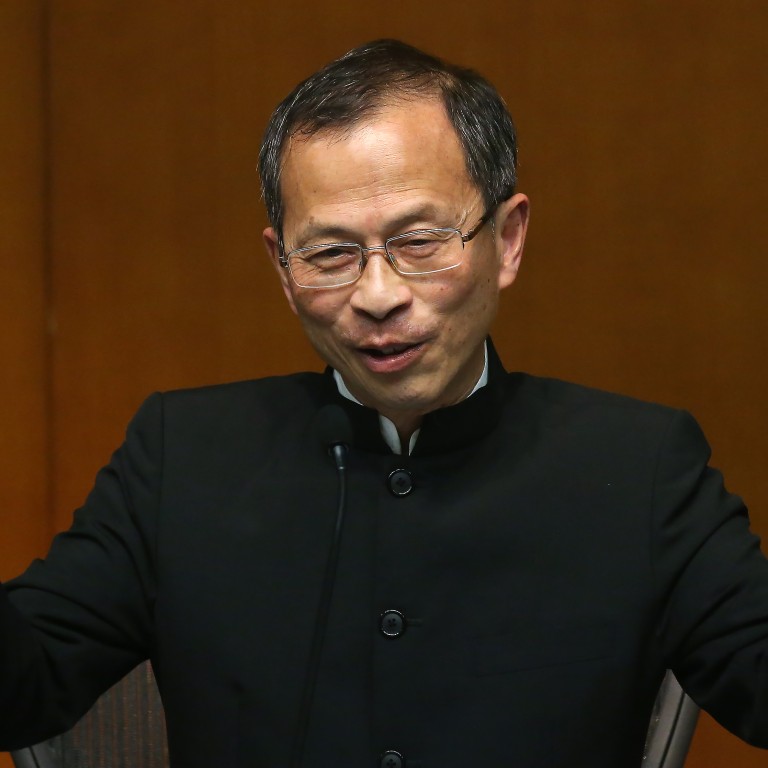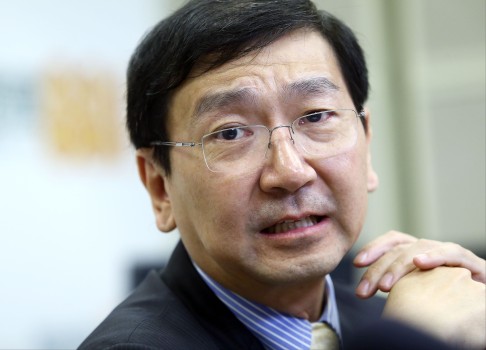
Search for HKU deputy head should have been halted when Johannes Chan was revealed as sole candidate, Legco president says
The search process for a key managerial post at the University of Hong Kong should have been halted as soon as the name of the sole candidate was exposed, Legislative Council president Jasper Tsang Yok-sing said today.
Tsang, an HKU alumnus, was commenting on the appointment saga involving former HKU law dean Professor Johannes Chan Man-mun, who was controversially rejected for the position of pro-vice-chancellor last week by the university’s governing council.
Pro-establishment lawmaker Tsang said the institution should have halted the search when some media revealed Chan’s name earlier.
“As personnel appointment must be kept confidential, if it was exposed to the light, the process should be halted,” Tsang said during an RTHK talk show.
He said the HKU council could then ask the search committee to restart the search. “After all, this position had been left vacant for a long time,” he said.
READ MORE: University of Hong Kong's law faculty defends former dean Johannes Chan amid fallout from appointment row
The HKU saga started at the height of pro-democracy protests in October last year when leaked emails from Occupy founder and HKU professor Benny Tai Yiu-ting were sent to the media by unknown sources. The emails revealed Tai had handled HK$1.45 million in donations for HKU, and Chan also handled part of the money.
The next month, pro-Beijing newspaper revealed that the HKU council was considering appointing Chan as a pro-vice-chancellor. The paper heavily criticised Chan for his links with Tai.
then in January ran a scoop reporting the results of the University Grants Committee assessment exercise, saying under Chan’s leadership, the HKU law school had fallen behind that of Chinese University.
Expecting the saga would have a negative impact on HKU, Tsang said one key decision by the institution’s council was to defer Chan’s appointment in June, citing its need to wait for the post of the supervising provost to be filled so that person could handle the appointment.

Tsang said this was an “unwise” decision that gave time for what had been a university appointment matter to blow up to become a wider political controversy.
“Students stormed a meeting. Then alumni by majority voted for a declaration [in support of Chan]. The whole affair became a political controversy in the community. It became difficult to handle,” he said.
Meanwhile, Dr Li Hui, an associate professor from HKU’s faculty of education criticised the Civic Party for escalating the appointment saga into a political incident, saying the pan-democratic party had transformed the university into "a 2.0 version of the Occupy movement".
"They have been escalating and politicising the event continuously ... such as voting [on the issue] at the University of Hong Kong Convocation, [and writing] an open letter to the [university’s] council to [influence] their decision," Li said on Commercial Radio.
Li said it was necessary to assess a candidate’s academic ability, political impartiality and management ability for a leader’s role at the university.
He said a candidate’s political stance would affect his decision in personnel arrangement, and criticised Chan for having strong relationships with pan-democratic political parties.
"[The candidate] should not be inclined to anyone but to truth ... I hope the pro-vice-chancellor could be politically neutral," Li said.
Li also questioned Chan’s academic achievements, saying his impact factor, an indicator measuring the average number of citations of articles published in academic journals, was just 0.0038 per cent. He also said Chan had only published 35 articles while working in academia for more than 20 years.
"I believe the selection committee recommended Chan only when they had no other candidates," he said.

